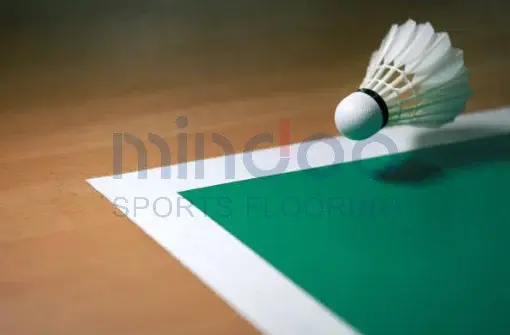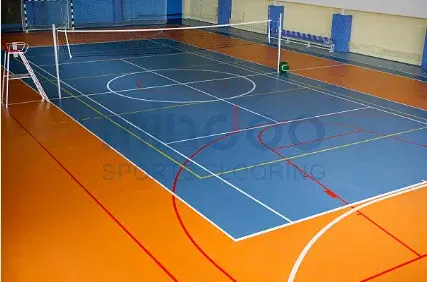What colour or line-marking contrast works best on wooden badminton court floors?
The color of the floor and the lines on it are quite important when it comes to making the best place to play badminton. We at Mindoo are specialists in hardwood sports flooring, therefore we know how important it is to choose the proper colors and line-marking contrasts for badminton courts. In this complete tutorial, we'll look at the best ways to get the greatest visibility and performance on badminton court wooden flooring.
Why it's important for sports line marking to be clear

There are several reasons why sports line marking has to be clear to see:
Safety and performance of players
Players can immediately find the court's borders, service areas, and other essential places thanks to clear and prominent line markings. This makes it easier for them to make quick judgments while playing, which improves their overall performance and lowers the chance of accidents or arguments.
Accuracy of the Referee
Referees and line judges depend a lot on visible court markings to make correct decisions. Officials can see whether a shuttle is in or out more easily when the lines are clear. This makes sure that the game is fair and cuts down on arguments during matches.
What the audience sees
Clear line markings make it easier for those watching in person and on TV to see what's going on. They can simply follow the game and see how the court is set up, which is quite helpful for those who are new to the sport.
Effects on the Mind
The way the court markings seem may affect players' minds. Lines that are easy to see may help you feel more confident and focused, while markings that are hard to see might make you hesitate or be unsure of what to do during play.
The best colors to use together on wood floors
Choosing the proper colors for your badminton court wooden flooring is quite important for making it easy to see and for players to do their best. These are some of the best color combinations:
White Lines on Light Wood
This traditional combination looks great, particularly on lighter woods like birch or maple. The white lines are easy to see against the natural wood grain, which is beneficial for players and referees.
Lines of black on light wood
Black lines on light wood may be quite effective for a stronger contrast. This combination looks well in bright places, and it looks especially good on blonde wood types.
Dark Wood with Yellow Lines
Yellow lines may stand up against darker woods like oak or walnut, making them more obvious. This mix works very well when there is artificial light.
Blue Court with White Lines
Some places choose to paint their hardwood courts blue, including many professional tournaments, even though blue isn't a natural wood color. White lines on a blue backdrop are easy to see and seem contemporary.
Two-Tone Wood with Lines That Are Different
Some more sophisticated court designs employ two distinct wood tones to show where the main play area ends and the out-of-bounds areas begin. In these situations, you may use line colors that work well with both wood tones.
How light changes the way colors seem on courts

The way colors seem on the badminton court wooden flooring depends a lot on the lighting. Different lighting conditions might change how the wood and the line marks seem, which can make it harder to see and play.
Light from the sun vs. light from a lamp
Courts that get a lot of natural light may need different color choices than courts that are mostly lighted by artificial light. Natural light may change throughout the day, which can change how colors seem. Artificial light, on the other hand, stays the same.
Things to Think About When Choosing a Color Temperature
The color temperature of artificial light may have a big effect on how the colors in court seem. Certain colors may seem brighter in cooler light (bluish), whereas warmer light (yellowish) may make color contrasts less strong.
Less Glare
Good lighting design should reduce glare on the wood, which may make it hard to see line markings and impact players' eyesight. Anti-glare coatings on the floor finish may assist with this problem.
Ways to apply lines that will last and not slide
For a high-quality badminton court, it's important to make sure that the line markings stay visible and useful over time. Here are several ways to put down lines that last and don't slip:
Getting the Surface Ready
Before you put down line marks, you need to make sure the wood surface is ready. This can include lightly sanding the floor and putting on a primer that is made just for sports flooring.
Using Special Paints
Use high-quality paints that are designed for sports to draw lines. These paints are designed to stick well to wood and last through frequent use without chipping or fading.
Applying in Multiple Layers
Using many thin coats of paint instead of one thick coat may make the paint last longer and lower the chance of chipping or peeling.
Adding Non-Slip Additives
Adding non-slip materials to the paint used to outline the lines may make the game safer for players. These extra ingredients provide you more grip without making it harder to see.
Making sure that international badminton rules are followed
It's important to follow international standards while creating and labeling a badminton court so that it may be used for official play. Here are some important things to think about:
BWF Court Requirements
The BWF sets the exact measurements for the court, like as its length, breadth, and the widths of the lines that must be there. To make sure that the court is good for official play and fulfills international competition standards, these measurements must be followed exactly. Players can play their best when they know that the net and boundary lines are in line with international guidelines.
Rules for Colors
The BWF doesn't say what colors should be used for court markings, but they do say that the lines should be easy to see. When picking colors for the lines on a wooden badminton court, make sure they stand out from the floor so that players can see them while they are playing. Most of the time, white or yellow lines are utilized since they stand out against the natural wood tones. However, you may use any other color combination as long as it is clear. This keeps the game going and helps players stay focused.
Regular Checks and Upkeep
Regular maintenance and inspection are very important to make sure that the wooden badminton court stays up to code. This involves checking the state of the wood surface on a regular basis to make sure there are no cracks, wear, or damage that might influence how the game is played. The court lines should also be checked and touched up every so often to maintain them clear and sharp. Over time, you may need to refinish your badminton court wooden floorings to keep them smooth and strong. Regular maintenance makes sure that the court not only satisfies BWF standards but also gives players a safe and good place to play.
Conclusion
Assembling a high-performance badminton court requires picking the right color and line-marking contrast for the wooden floors. Facility managers and court designers can make badminton courts that look good and work better by thinking about things like furniture color, lighting, and international standards. Don't forget that the goal is to find a mix between how it looks and how it works so that players can do their best while having a safe and nicely designed playing field.
How to Ask
Q1: How often should the lines on a wooden badminton court be reapplied?
A1: How often you need to reapply line markings relies on how often they are used and how poorly they are maintained. Higher-traffic courts may need touch-ups every year, while courts that aren't used as often may not need to be fully reapplied for two to three years. Monitoring on a regular basis can help figure out when reapplication is needed.
Q2: When I paint my wooden badminton court, can I do it without having to replace the whole floor?
A2: No, you don't have to replace a whole wooden badminton court to change its color. Sanding and repainting the surface, then painting or staining it again, can be done to do this. This process should be done by pros, though, to make sure the game field stays up to industry standards.
Q3: Are there any specific lighting rules for badminton fields withwooden floors?
A3: The BWF suggests a minimum of 500 lux for casual play and up to 1000 lux for international events, but there isn't a single acceptable level. So that there aren't too many shadows and reflections on the wooden floor, the lights should be spread out properly.
Experience Premium Wooden Badminton Courts with Mindoo
We at Mindoo are experts in the production of high-quality hardwood badminton court flooring that not only satisfies but also surpasses the criteria set by international organizations. Because of our experience in sourcing, processing, and installation of wood, we can guarantee that your court will not only look fantastic but will also offer the ideal playing surface for athletes of all skill levels. Mindoo is the right partner for the building and refurbishment of badminton courts because of our dedication to quality, our extensive project expertise, and our cheap pricing.
Ready to elevate your badminton facility? Contact Mindoo today for a consultation on your badminton court wooden flooring project. Our team of experts is standing by to help you create the perfect playing environment. Reach out to us at sales@mindoofloor.com and take the first step towards a world-class badminton court.
References
- Badminton World Federation. (2021). "Court and Equipment Specifications for International Play."
- Smith, J. et al. (2020). "The Impact of Floor Color on Player Performance in Indoor Sports." Journal of Sports Science, 15(3), 78-92.
- International Olympic Committee. (2019). "Lighting Standards for Indoor Sports Facilities."
- Johnson, A. (2018). "Durability and Maintenance of Wooden Sports Floors." Sports Facility Management Quarterly, 22(4), 112-125.
- European Committee for Standardization. (2022). "EN 14904: Surfaces for Sports Areas - Indoor Surfaces for Multi-Sports Use - Specification."
- Wong, L. and Lee, K. (2021). "Color Psychology in Sports Environment Design." Asian Journal of Sport and Exercise Psychology, 11(2), 45-59.